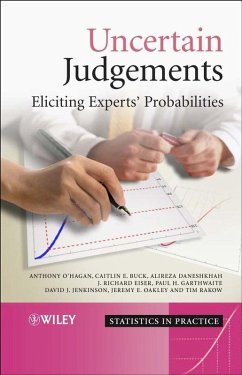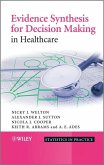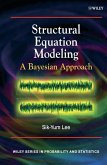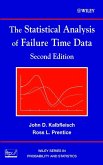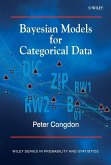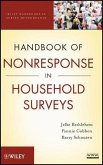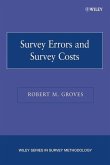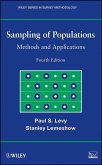Uncertain Judgements (eBook, PDF)
Eliciting Experts' Probabilities


Alle Infos zum eBook verschenken

Uncertain Judgements (eBook, PDF)
Eliciting Experts' Probabilities
- Format: PDF
- Merkliste
- Auf die Merkliste
- Bewerten Bewerten
- Teilen
- Produkt teilen
- Produkterinnerung
- Produkterinnerung

Hier können Sie sich einloggen

Bitte loggen Sie sich zunächst in Ihr Kundenkonto ein oder registrieren Sie sich bei bücher.de, um das eBook-Abo tolino select nutzen zu können.
Elicitation is the process of extracting expert knowledge about some unknown quantity or quantities, and formulating that information as a probability distribution. Elicitation is important in situations, such as modelling the safety of nuclear installations or assessing the risk of terrorist attacks, where expert knowledge is essentially the only source of good information. It also plays a major role in other contexts by augmenting scarce observational data, through the use of Bayesian statistical methods. However, elicitation is not a simple task, and practitioners need to be aware of a wide…mehr
- Geräte: PC
- mit Kopierschutz
- eBook Hilfe
- Größe: 2.39MB
![Evidence Synthesis for Decision Making in Healthcare (eBook, PDF) Evidence Synthesis for Decision Making in Healthcare (eBook, PDF)]() Nicky J. WeltonEvidence Synthesis for Decision Making in Healthcare (eBook, PDF)61,99 €
Nicky J. WeltonEvidence Synthesis for Decision Making in Healthcare (eBook, PDF)61,99 €![Structural Equation Modeling (eBook, PDF) Structural Equation Modeling (eBook, PDF)]() Sik-Yum LeeStructural Equation Modeling (eBook, PDF)111,99 €
Sik-Yum LeeStructural Equation Modeling (eBook, PDF)111,99 €![The Statistical Analysis of Failure Time Data (eBook, PDF) The Statistical Analysis of Failure Time Data (eBook, PDF)]() John D. KalbfleischThe Statistical Analysis of Failure Time Data (eBook, PDF)173,99 €
John D. KalbfleischThe Statistical Analysis of Failure Time Data (eBook, PDF)173,99 €![Bayesian Models for Categorical Data (eBook, PDF) Bayesian Models for Categorical Data (eBook, PDF)]() Peter CongdonBayesian Models for Categorical Data (eBook, PDF)99,99 €
Peter CongdonBayesian Models for Categorical Data (eBook, PDF)99,99 €![Handbook of Nonresponse in Household Surveys (eBook, PDF) Handbook of Nonresponse in Household Surveys (eBook, PDF)]() Jelke BethlehemHandbook of Nonresponse in Household Surveys (eBook, PDF)160,99 €
Jelke BethlehemHandbook of Nonresponse in Household Surveys (eBook, PDF)160,99 €![Survey Errors and Survey Costs (eBook, PDF) Survey Errors and Survey Costs (eBook, PDF)]() Robert M. GrovesSurvey Errors and Survey Costs (eBook, PDF)120,99 €
Robert M. GrovesSurvey Errors and Survey Costs (eBook, PDF)120,99 €![Sampling of Populations (eBook, PDF) Sampling of Populations (eBook, PDF)]() Paul S. LevySampling of Populations (eBook, PDF)138,99 €
Paul S. LevySampling of Populations (eBook, PDF)138,99 €-
-
-
Dieser Download kann aus rechtlichen Gründen nur mit Rechnungsadresse in A, B, BG, CY, CZ, D, DK, EW, E, FIN, F, GR, HR, H, IRL, I, LT, L, LR, M, NL, PL, P, R, S, SLO, SK ausgeliefert werden.
Hinweis: Dieser Artikel kann nur an eine deutsche Lieferadresse ausgeliefert werden.
- Produktdetails
- Verlag: Wiley-Blackwell
- Seitenzahl: 338
- Erscheinungstermin: 30. August 2006
- Englisch
- ISBN-13: 9780470033302
- Artikelnr.: 37289820
- Verlag: Wiley-Blackwell
- Seitenzahl: 338
- Erscheinungstermin: 30. August 2006
- Englisch
- ISBN-13: 9780470033302
- Artikelnr.: 37289820
- Herstellerkennzeichnung Die Herstellerinformationen sind derzeit nicht verfügbar.
1 Fundamentals of Probability and Judgement 1
1.1 Introduction 1
1.2 Probability and elicitation 1
1.2.1 Probability 1
1.2.2 Random variables and probability distributions 3
1.2.3 Summaries of distributions 5
1.2.4 Joint distributions 7
1.2.5 Bayes' Theorem 8
1.2.6 Elicitation 9
1.3 Uncertainty and the interpretation of probability 10
1.3.1 Aleatory and epistemic uncertainty 10
1.3.2 Frequency and personal probabilities 11
1.3.3 An extended example 12
1.3.4 Implications for elicitation 14
1.4 Elicitation and the psychology of judgement 14
1.4.1 Judgement - absolute or relative? 15
1.4.2 Beyond perception 18
1.4.3 Implications for elicitation 20
1.5 Of what use are such judgements? 20
1.5.1 Normative theories of probability 21
1.5.2 Coherence 21
1.5.3 Do elicited probabilities have the desired interpretation? 22
1.6 Conclusions 24
1.6.1 Elicitation practice 24
1.6.2 Research questions 24
2 The Elicitation Context 25
2.1 How and who? 25
2.1.1 Choice of format 25
2.1.2 What is an expert? 26
2.2 The elicitation process 27
2.2.1 Roles within the elicitation process 28
2.2.2 A model for the elicitation process 28
2.3 Conventions in Chapters 3 to 9 31
2.4 Conclusions 31
2.4.1 Elicitation practice 31
2.4.2 Research question 31
3 The Psychology of Judgement Under Uncertainty 33
3.1 Introduction 33
3.1.1 Why psychology? 33
3.1.2 Chapter overview 34
3.2 Understanding the task and the expert 35
3.2.1 Cognitive capabilities: the proper view of human information
processing? 35
3.2.2 Constructive processes: the proper view of the process? 36
3.3 Understanding research on human judgement 37
3.3.1 Experts versus the rest: the proper focus of research? 37
3.3.2 Early research on subjective probability: 'conservatism' in Bayesian
probability revision 38
3.4 The heuristics and biases research programme 38
3.4.1 Availability 39
3.4.2 Representativeness 41
3.4.3 Do frequency representations remove the biases attributed to
availability and representativeness? 46
3.4.4 Anchoring-and-adjusting 47
3.4.5 Support theory 49
3.4.6 The affect heuristic 51
3.4.7 Critique of the heuristics and biases approach 52
3.5 Experts and expertise 52
3.5.1 The heuristics and biases approach 53
3.5.2 The cognitive science approach 53
3.5.3 'The middle way' 54
3.6 Three meta-theories of judgement 55
3.6.1 The cognitive continuum 56
3.6.2 The inside versus the outside view 56
3.6.3 The naive intuitive statistician metaphor 58
3.7 Conclusions 58
3.7.1 Elicitation practice 58
3.7.2 Research questions 59
4 The Elicitation of Probabilities 61
4.1 Introduction 61
4.2 The calibration of subjective probabilities 62
4.2.1 Research methods in calibration research 67
4.2.2 Calibration research: general findings 68
4.2.3 Calibration research in applied settings 72
4.2.4 A case study in probability judgement: calibration research in
medicine 74
4.3 The calibration of subjective probabilities: theories and explanations
77
4.3.1 Explanations of probability judgement in calibration tasks 77
4.3.2 Theories of the calibration of subjective probabilities 79
4.4 Representations and methods 82
4.4.1 Different modes for representing uncertainty 83
4.4.2 Different formats for eliciting responses 87
4.4.3 Key lessons 89
4.5 Debiasing 89
4.5.1 General principles for debiasing judgement 90
4.5.2 Managing noise 91
4.5.3 Redressing insufficient regressiveness in prediction 92
4.5.4 A caveat concerning post hoc corrections 94
4.6 Conclusions 95
4.6.1 Elicitation practice 95
4.6.2 Research questions 95
5 Eliciting Distributions - General 97
5.1 From probabilities to distributions 97
5.1.1 From a few to infinity 98
5.1.2 Summaries 99
5.1.3 Fitting 100
5.1.4 Overview 100
5.2 Eliciting univariate distributions 100
5.2.1 Summaries based on probabilities 100
5.2.2 Proportions 104
5.2.3 Other summaries 105
5.3 Eliciting multivariate distributions 107
5.3.1 Structuring 107
5.3.2 Eliciting association 108
5.3.3 Joint and conditional probabilities 111
5.3.4 Regression 112
5.3.5 Many variables 113
5.4 Uncertainty and imprecision 114
5.4.1 Quantifying elicitation error 114
5.4.2 Sensitivity analysis 115
5.4.3 Feedback and overfitting 116
5.5 Conclusions 118
5.5.1 Elicitation practice 118
5.5.2 Research questions 119
6 Eliciting and Fitting a Parametric Distribution 121
6.1 Introduction 121
6.2 Outline of this chapter 122
6.3 Eliciting opinion about a proportion 124
6.4 Eliciting opinion about a general scalar quantity 132
6.5 Eliciting opinion about a set of proportions 137
6.6 Eliciting opinion about the parameters of a multivariate normal
distribution 139
6.7 Eliciting opinion about the parameters of a linear regression model 142
6.8 Eliciting opinion about the parameters of a generalised linear model
145
6.9 Elicitation methods for other problems 147
6.10 Deficiencies in existing research 149
6.11 Conclusions 150
6.11.1 Elicitation practice 150
6.11.2 Research questions 151
7 Eliciting Distributions - Uncertainty and Imprecision 153
7.1 Introduction 153
7.2 Imprecise probabilities 153
7.3 Incomplete information 156
7.4 Summary 160
7.5 Conclusions 160
7.5.1 Elicitation practice 160
7.5.2 Research questions 160
8 Evaluating Elicitation 161
8.1 Introduction 161
8.1.1 Good elicitation 161
8.1.2 Inaccurate knowledge 161
8.1.3 Automatic calibration 162
8.1.4 Lessons of the psychological literature 163
8.1.5 Outline of this chapter 163
8.2 Scoring rules 163
8.2.1 Scoring rules for discrete probability distributions 165
8.2.2 Scoring rules for continuous probability distributions 169
8.3 Coherence, feedback and overfitting 171
8.3.1 Coherence and calibration 171
8.3.2 Feedback and overfitting 173
8.4 Conclusions 176
8.4.1 Elicitation practice 176
8.4.2 Research questions 177
9 Multiple Experts 179
9.1 Introduction 179
9.2 Mathematical aggregation 180
9.2.1 Bayesian methods 180
9.2.2 Opinion pooling 181
9.2.3 Cooke's method 184
9.2.4 Performance of mathematical aggregation 185
9.3 Behavioural aggregation 186
9.3.1 Group elicitation 186
9.3.2 Other methods of behavioural aggregation 188
9.3.3 Performance of behavioural methods 190
9.4 Discussion 190
9.5 Elicitation practice 191
9.6 Research questions 191
10 Published Examples of the Formal Elicitation of Expert Opinion 193
10.1 Some applications 193
10.2 An example of an elicitation interview - eliciting engine sales 193
10.3 Medicine 195
10.3.1 Diagnosis and treatment decisions 195
10.3.2 Clinical trials 199
10.3.3 Survival analysis 201
10.3.4 Clinical psychology 202
10.4 The nuclear industry 204
10.5 Veterinary science 206
10.6 Agriculture 207
10.7 Meteorology 208
10.8 Business studies, economics and finance 209
10.9 Other professions 212
10.10 Other examples of the elicitation of subjective probabilities 213
11 Guidance on Best Practice 217
12 Areas for Research 223
Glossary 227
Bibliography 267
Author Index 307
Index 313
1 Fundamentals of Probability and Judgement 1
1.1 Introduction 1
1.2 Probability and elicitation 1
1.2.1 Probability 1
1.2.2 Random variables and probability distributions 3
1.2.3 Summaries of distributions 5
1.2.4 Joint distributions 7
1.2.5 Bayes' Theorem 8
1.2.6 Elicitation 9
1.3 Uncertainty and the interpretation of probability 10
1.3.1 Aleatory and epistemic uncertainty 10
1.3.2 Frequency and personal probabilities 11
1.3.3 An extended example 12
1.3.4 Implications for elicitation 14
1.4 Elicitation and the psychology of judgement 14
1.4.1 Judgement - absolute or relative? 15
1.4.2 Beyond perception 18
1.4.3 Implications for elicitation 20
1.5 Of what use are such judgements? 20
1.5.1 Normative theories of probability 21
1.5.2 Coherence 21
1.5.3 Do elicited probabilities have the desired interpretation? 22
1.6 Conclusions 24
1.6.1 Elicitation practice 24
1.6.2 Research questions 24
2 The Elicitation Context 25
2.1 How and who? 25
2.1.1 Choice of format 25
2.1.2 What is an expert? 26
2.2 The elicitation process 27
2.2.1 Roles within the elicitation process 28
2.2.2 A model for the elicitation process 28
2.3 Conventions in Chapters 3 to 9 31
2.4 Conclusions 31
2.4.1 Elicitation practice 31
2.4.2 Research question 31
3 The Psychology of Judgement Under Uncertainty 33
3.1 Introduction 33
3.1.1 Why psychology? 33
3.1.2 Chapter overview 34
3.2 Understanding the task and the expert 35
3.2.1 Cognitive capabilities: the proper view of human information
processing? 35
3.2.2 Constructive processes: the proper view of the process? 36
3.3 Understanding research on human judgement 37
3.3.1 Experts versus the rest: the proper focus of research? 37
3.3.2 Early research on subjective probability: 'conservatism' in Bayesian
probability revision 38
3.4 The heuristics and biases research programme 38
3.4.1 Availability 39
3.4.2 Representativeness 41
3.4.3 Do frequency representations remove the biases attributed to
availability and representativeness? 46
3.4.4 Anchoring-and-adjusting 47
3.4.5 Support theory 49
3.4.6 The affect heuristic 51
3.4.7 Critique of the heuristics and biases approach 52
3.5 Experts and expertise 52
3.5.1 The heuristics and biases approach 53
3.5.2 The cognitive science approach 53
3.5.3 'The middle way' 54
3.6 Three meta-theories of judgement 55
3.6.1 The cognitive continuum 56
3.6.2 The inside versus the outside view 56
3.6.3 The naive intuitive statistician metaphor 58
3.7 Conclusions 58
3.7.1 Elicitation practice 58
3.7.2 Research questions 59
4 The Elicitation of Probabilities 61
4.1 Introduction 61
4.2 The calibration of subjective probabilities 62
4.2.1 Research methods in calibration research 67
4.2.2 Calibration research: general findings 68
4.2.3 Calibration research in applied settings 72
4.2.4 A case study in probability judgement: calibration research in
medicine 74
4.3 The calibration of subjective probabilities: theories and explanations
77
4.3.1 Explanations of probability judgement in calibration tasks 77
4.3.2 Theories of the calibration of subjective probabilities 79
4.4 Representations and methods 82
4.4.1 Different modes for representing uncertainty 83
4.4.2 Different formats for eliciting responses 87
4.4.3 Key lessons 89
4.5 Debiasing 89
4.5.1 General principles for debiasing judgement 90
4.5.2 Managing noise 91
4.5.3 Redressing insufficient regressiveness in prediction 92
4.5.4 A caveat concerning post hoc corrections 94
4.6 Conclusions 95
4.6.1 Elicitation practice 95
4.6.2 Research questions 95
5 Eliciting Distributions - General 97
5.1 From probabilities to distributions 97
5.1.1 From a few to infinity 98
5.1.2 Summaries 99
5.1.3 Fitting 100
5.1.4 Overview 100
5.2 Eliciting univariate distributions 100
5.2.1 Summaries based on probabilities 100
5.2.2 Proportions 104
5.2.3 Other summaries 105
5.3 Eliciting multivariate distributions 107
5.3.1 Structuring 107
5.3.2 Eliciting association 108
5.3.3 Joint and conditional probabilities 111
5.3.4 Regression 112
5.3.5 Many variables 113
5.4 Uncertainty and imprecision 114
5.4.1 Quantifying elicitation error 114
5.4.2 Sensitivity analysis 115
5.4.3 Feedback and overfitting 116
5.5 Conclusions 118
5.5.1 Elicitation practice 118
5.5.2 Research questions 119
6 Eliciting and Fitting a Parametric Distribution 121
6.1 Introduction 121
6.2 Outline of this chapter 122
6.3 Eliciting opinion about a proportion 124
6.4 Eliciting opinion about a general scalar quantity 132
6.5 Eliciting opinion about a set of proportions 137
6.6 Eliciting opinion about the parameters of a multivariate normal
distribution 139
6.7 Eliciting opinion about the parameters of a linear regression model 142
6.8 Eliciting opinion about the parameters of a generalised linear model
145
6.9 Elicitation methods for other problems 147
6.10 Deficiencies in existing research 149
6.11 Conclusions 150
6.11.1 Elicitation practice 150
6.11.2 Research questions 151
7 Eliciting Distributions - Uncertainty and Imprecision 153
7.1 Introduction 153
7.2 Imprecise probabilities 153
7.3 Incomplete information 156
7.4 Summary 160
7.5 Conclusions 160
7.5.1 Elicitation practice 160
7.5.2 Research questions 160
8 Evaluating Elicitation 161
8.1 Introduction 161
8.1.1 Good elicitation 161
8.1.2 Inaccurate knowledge 161
8.1.3 Automatic calibration 162
8.1.4 Lessons of the psychological literature 163
8.1.5 Outline of this chapter 163
8.2 Scoring rules 163
8.2.1 Scoring rules for discrete probability distributions 165
8.2.2 Scoring rules for continuous probability distributions 169
8.3 Coherence, feedback and overfitting 171
8.3.1 Coherence and calibration 171
8.3.2 Feedback and overfitting 173
8.4 Conclusions 176
8.4.1 Elicitation practice 176
8.4.2 Research questions 177
9 Multiple Experts 179
9.1 Introduction 179
9.2 Mathematical aggregation 180
9.2.1 Bayesian methods 180
9.2.2 Opinion pooling 181
9.2.3 Cooke's method 184
9.2.4 Performance of mathematical aggregation 185
9.3 Behavioural aggregation 186
9.3.1 Group elicitation 186
9.3.2 Other methods of behavioural aggregation 188
9.3.3 Performance of behavioural methods 190
9.4 Discussion 190
9.5 Elicitation practice 191
9.6 Research questions 191
10 Published Examples of the Formal Elicitation of Expert Opinion 193
10.1 Some applications 193
10.2 An example of an elicitation interview - eliciting engine sales 193
10.3 Medicine 195
10.3.1 Diagnosis and treatment decisions 195
10.3.2 Clinical trials 199
10.3.3 Survival analysis 201
10.3.4 Clinical psychology 202
10.4 The nuclear industry 204
10.5 Veterinary science 206
10.6 Agriculture 207
10.7 Meteorology 208
10.8 Business studies, economics and finance 209
10.9 Other professions 212
10.10 Other examples of the elicitation of subjective probabilities 213
11 Guidance on Best Practice 217
12 Areas for Research 223
Glossary 227
Bibliography 267
Author Index 307
Index 313
